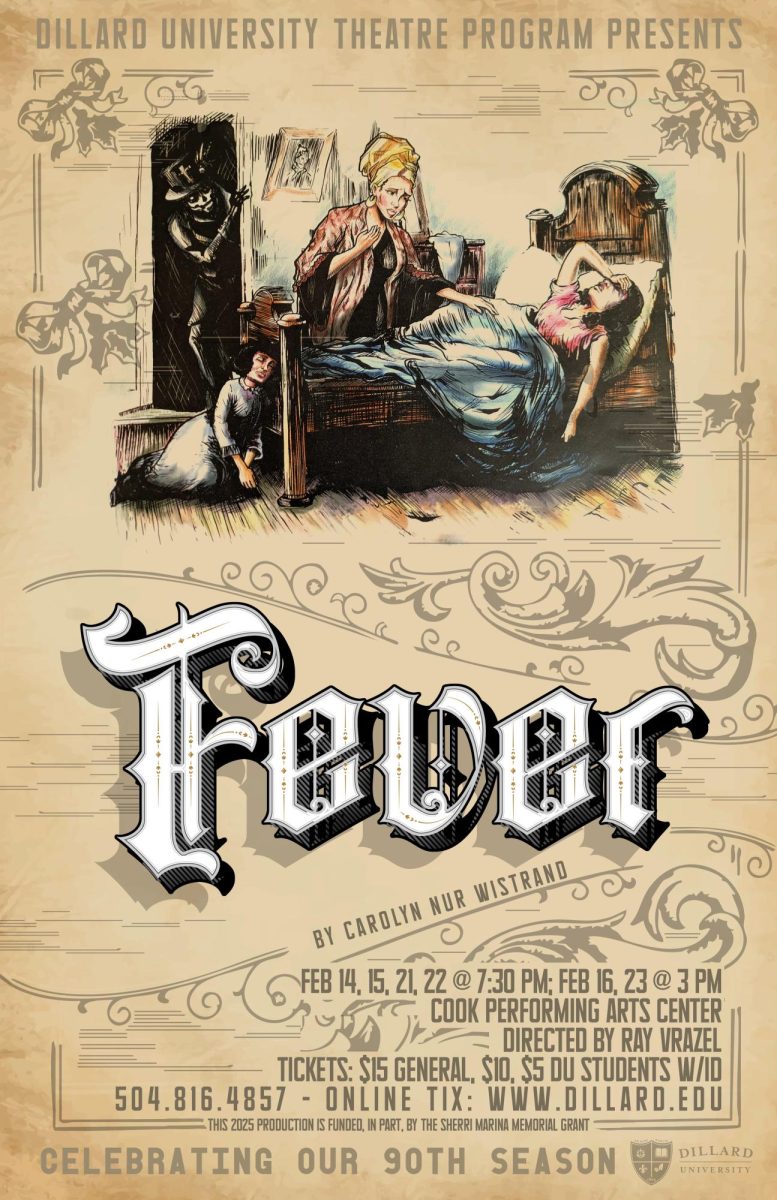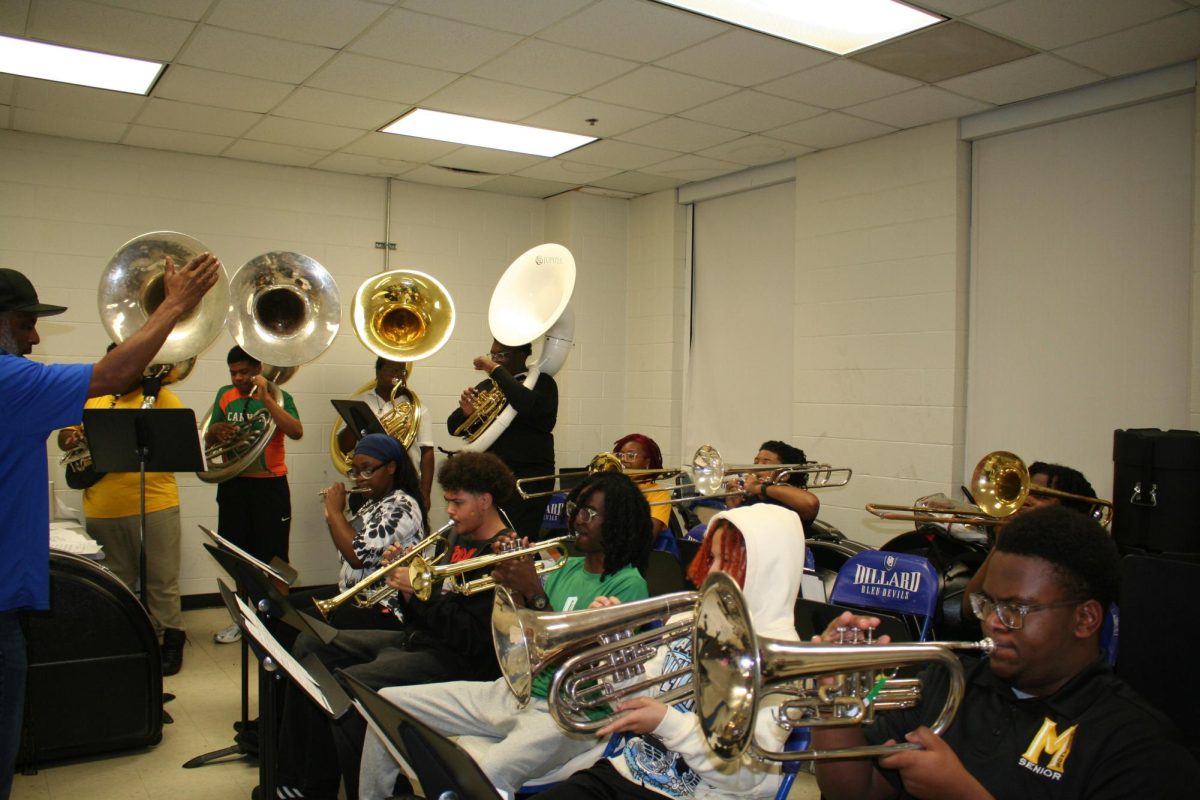The Dillard University’s Theater Department debuts Fever on Feb. 14, a new play on the New Orleans 1853 Yellow Fever epidemic.
Fever follows the story of Marie Laveau, a free-colored woman born in New Orleans in the 19th century. Laveau was a Vodou priestess and spiritual leader who used her healing abilities to cure those who were infected by Yellow Fever. With no known cure, she turns to herbal remedies to nurse people back to health, compared to American doctors who used methods such as bloodletting in an attempt to get rid of the disease. When her daughter, Philoméne, is attacked by the fever, Laveau is visited by the Haitian God of the cemetery who wants to take her. Laveau loses faith in her power and does anything she can to save Philoméne.
Carolyn Nur Wistrand, an award-winning playwright and an English professor at Dillard University, wrote Fever for Dillard University Theatre’s 90th historic season. She was inspired to write it because of the COVID-19 epidemic that hit the United States hard in 2020.
“As we were all going through quarantine, I started to look at epidemics that occurred in the 19th century. I came across that in New Orleans, the yellow fever epidemic was not just in 1853, but it was throughout the 19th century that citizens of New Orleans were inflicted by yellow fever,” Wistrand stated.
Wistrand explained how important research is as a historical dramatist. As she explored more into the time period of 1853, she discovered how drastic this disease was on the citizens of New Orleans.
“Since it was the worst single epidemic, all of the newspapers that are chronicled have the daily, between July and August, at the end of each week they did interments from the cemetery,” she explained. “By early August, it’s almost over 1500-2000 people a week were being killed here in New Orleans, stricken by Yellow fever because nobody knew what caused it.”
As Wistrand deepened her study, this is when she found the role Marie Laveau played. Laveau was demonized for her practices because they were rooted in African traditions.
“Marie Laveau, for over a century, was vilified by white journalists because she practiced African traditions during the time of enslavement to help people honor their own identity and not just as a body that belonged to an enslaver,” Wistrand explained. “Because of this, she was called a witch because they knew nothing about African traditions.”
The New York Times published Laveau’s obituary in 1881, where she was described as a healer during yellow fever.
“It’s a bit different from normally when we get plays that have already been produced,” said Ray Vrazel, assistant professor of Theater at Dillard University and director of this historic play. “This one is a new play so it’s the first time looking at it so we have a clean slate. We’re creating as we go along–we’re living out the play in real-time. It’s much more fun and exciting,” said Vrazel.
Vrazel explained that preparing for the play that was set back in 1853 wasn’t challenging. Wistrand conducted extensive research on the era ensuring that while this is a theatrical production, everything is rooted in historical facts.
“The playwright did an extensive amount of research on that era and about yellow fever, what the symptoms were, how it was treated, what caused it, all these things are factual,” Vrazel stated. “Everything in the play is supported by historical documents,” he continued.
With a solid historical foundation, Vrazel was in charge of bringing the play to life. The actors not only embody real historic figures but also navigate the play’s metaphysical elements, colliding both the spiritual and physical world.
“The spirits have their own sanity,” Vrazel said. “The God of the graveyard, Glapion, Marie Laveau’s dead husband comes back and floats around talking to Marie. You got these aspects of the play that are spiritual.”
Krystal Gem Jackson, a new Theater professor at Dillard University, is playing Laveau in the play. She stated she was shocked to learn that she got the position.
“I was excited of course, but I’m not originally from Louisiana. I’m from Jackson, Mississippi [and] spent a good deal of time in Los Angeles. Although I’ve worked in New Orleans off and on, this is my first time living here, fully immersed in the culture,” Jackson explained. “I was nervous at first, ‘cause this is a real person. The last thing I want to do is misrepresent, mess it up,” she continued.
Jackson also did her own research on who Laveau was to better embody her character. This deep dove into Laveau’s life and legacy allowed her to capture the essence of who she was.
“I started going to Mary Healing Center, there is a botanica there and it’s run by a priestess by Marie Laveau specifically,” Jackson explained. “Started just going. At first, I didn’t speak to anybody, just started going, hanging out. What is this, how does this smell like? How did I feel entering this space? I started leaving cowrie shells and cinnamon, Oshun-y stuff on her big Marie Laveau altar. Started talking to the maid idle of Marie, walking down St. Anne Street, spending more time in the quarter. Getting more immersed in the tangible realities of the place. That helped a lot,” she said.
Fever’s production runs on the Main Stage in Cook Auditorium, Dillard University on Feb. 14, 15, 21, and 22 at 7:30 p.m. and Feb 16 and Feb. 22 at 3 p.m.




























